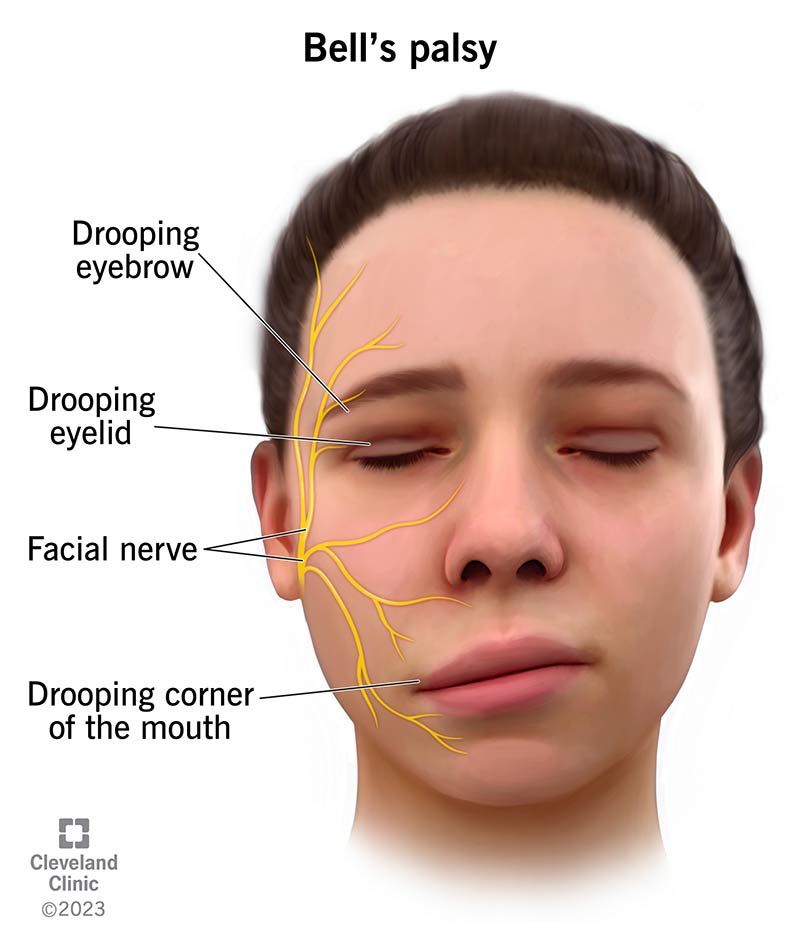
Bell's Palsy
Bell's palsy is a condition that causes the muscles on one side of the face to suddenly become weak. Most of the time the muscle weakness is only temporary and can get much better in a matter of weeks.
Overview
Bells Palsy is a non-progressive neurological condition affecting the facial nerve (7th cranial nerve). A hallmark of Bell's palsy is a sudden onset of facial paralysis, which may be accompanied by a mild fever, weakness on one side of the face, and pain behind the ear on the affected side. It involves damage to the cranial (facial) nerve which controls the muscles used for blinking and facial expressions. The condition is also known as acute peripheral facial palsy. The weakness makes half of the face appear to droop. It can occur at any age.
Causes
Bell's palsy may be caused by swelling and inflammation of the nerve that controls the muscles on one side of the face. It could be caused by a reaction that occurs after a viral infection. People experience Bell's palsy following an infection including HSV-1 (the virus responsible for cold sores), Epstein-Barr virus (the virus that causes mononucleosis), Varicella The flu ear infections, Lyme disease, and head or face trauma are all possibilities.
Symptoms
Facial weakness which is typically symmetrical. Usually, the weakness sets in fast within a few hours or so. You may become aware of the weakness right after waking up which makes it seem very dramatic. It might get worse over a few days. Depending on whether the nerve is completely or partially damaged the effects of the weakness differ.
You might have a sagging face. Just half of your face may move when you smile.
On the affected side chewing food could be problematic.
Food can get stuck in the space created by your cheek and gums.
Saliva and drinks could spill out of your mouth's side.
On the affected side you may be unable to close your eyes.
This could result in dry or watery eyes.
You may not be able to puff out your cheek whistle or furrow your brow.
Given that the muscles on the side of your face aid in the formation of certain words you might find it difficult to speak. Words beginning with a P for example.
Most cases only cause a slight ache or are painless. On the other hand, some people experience ear pain that lasts for a few days.
Your sensitivity to sound may have increased making normal noises seem louder than usual and uncomfortable loud noises. This is due to the possibility of an ear muscle spasm.
The impacted side of your tongue may lose its ability to perceive taste.
Ayurvedic View
Ardita- Ucchai bashai (speaking loudly), vega dharana (suppression of natural urges), aaghata (injury) which leads to the aggravation of vata dosha, that settles in mukha (face), which affects the appearance of the face and its functioning of nearby nerves resulting in bells palsy. Ayurveda's approach is to bring doshas back to their prakruta (balanced state), improve the symmetry of the face, and prevent further disability caused by this disease by following ayurvedic treatments.
Ayurvedic Treatments
Snehanam Churna pinda swedanam Pinda swedana (Kukutanda pinda swedanam) Nasyam Shirodhara Pichu (Shiropichu) Dhoomanam
Naturopathy Treatments
Mind sound resonance technique Exercise therapy Electrotherapy Acupuncture Chiropractic Dorn therapy & Yoga therapy.
Bell's Palsy
Treatment for
DISCLAIMER: Listed treatment details are only for information purposes. Treatments and duration may vary depending on numerous factors. Treatments for your condition may not be limited to this list.






















